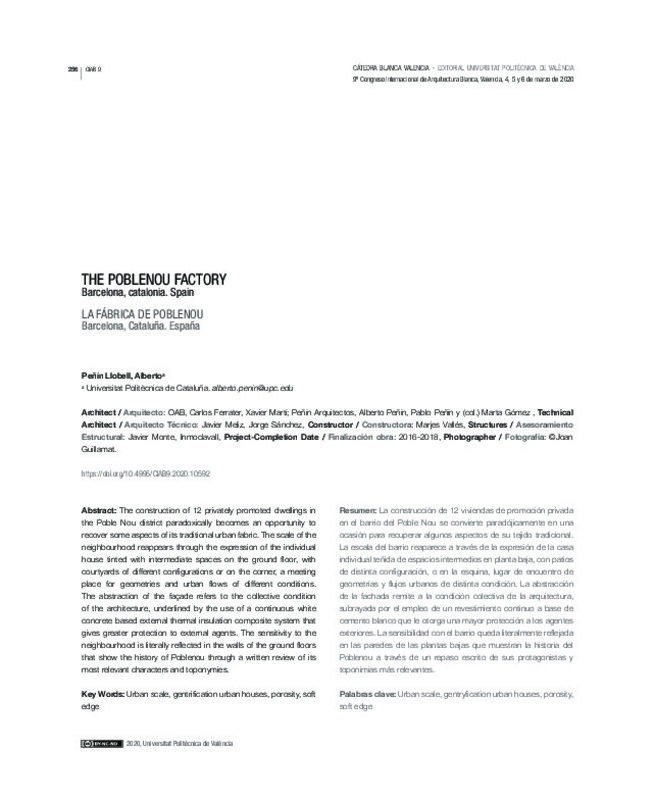JavaScript is disabled for your browser. Some features of this site may not work without it.
Buscar en RiuNet
Listar
Mi cuenta
Estadísticas
Ayuda RiuNet
Admin. UPV
La fábrica del Poblenou
Mostrar el registro sencillo del ítem
Ficheros en el ítem
| dc.contributor.author | Peñín Llobell, Alberto
|
es_ES |
| dc.coverage.spatial | east=2.202795; north=41.4034307; name=Bilbao - Pujades, 08018 Barcelona, Espanya | es_ES |
| dc.date.accessioned | 2020-04-06T08:44:08Z | |
| dc.date.available | 2020-04-06T08:44:08Z | |
| dc.date.issued | 2020-04-06T08:44:08Z | |
| dc.identifier.isbn | 9788490488102 | |
| dc.identifier.issn | 2695-7884 | |
| dc.identifier.uri | http://hdl.handle.net/10251/140176 | |
| dc.description.abstract | [EN] The construction of 12 privately promoted dwellings in the Poble Nou district paradoxically becomes an opportunity to recover some aspects of its traditional urban fabric. The scale of the neighbourhood reappears through the expression of the individual house tinted with intermediate spaces on the ground floor, with courtyards of different configurations or on the corner, a meeting place for geometries and urban flows of different conditions. The abstraction of the façade refers to the collective condition of the architecture, underlined by the use of a continuous white concrete based external thermal insulation composite system that gives greater protection to external agents. The sensitivity to the neighbourhood is literally reflected in the walls of the ground floors that show the history of Poblenou through a written review of its most relevant characters and toponymies. | es_ES |
| dc.description.abstract | [ES] La construcción de 12 viviendas de promoción privada en el barrio del Poble Nou se convierte paradójicamente en una ocasión para recuperar algunos aspectos de su tejido tradicional. La escala del barrio reaparece a través de la expresión de la casa individual teñida de espacios intermedios en planta baja, con patios de distinta configuración, o en la esquina, lugar de encuentro de geometrías y flujos urbanos de distinta condición. La abstracción de la fachada remite a la condición colectiva de la arquitectura, subrayada por el empleo de un revestimiento continuo a base de cemento blanco que le otorga una mayor protección a los agentes exteriores. La sensibilidad con el barrio queda literalmente reflejada en las paredes de las plantas bajas que muestran la historia del Poblenou a través de un repaso escrito de sus protagonistas y toponimias más relevantes. | es_ES |
| dc.language | Español | es_ES |
| dc.language | Inglés | es_ES |
| dc.publisher | Editorial Universitat Politècnica de València | es_ES |
| dc.relation.ispartof | IX Congreso Internacional Arquitectura Blanca | |
| dc.rights | Reconocimiento - No comercial - Sin obra derivada (by-nc-nd) | es_ES |
| dc.subject | Hormigón visto | es_ES |
| dc.subject | Arquitectura | es_ES |
| dc.subject | Exposed concrete | es_ES |
| dc.subject | Architecture | es_ES |
| dc.subject | Urban scale model | es_ES |
| dc.subject | Gentryfication | es_ES |
| dc.subject | Urban houses | es_ES |
| dc.subject | Porosity | es_ES |
| dc.subject | Soft edge | es_ES |
| dc.title | La fábrica del Poblenou | es_ES |
| dc.title.alternative | The Poblenou Factory | es_ES |
| dc.type | Capítulo de libro | es_ES |
| dc.type | Comunicación en congreso | es_ES |
| dc.identifier.doi | 10.4995/CIAB9.2020.10592 | |
| dc.rights.accessRights | Abierto | es_ES |
| dc.description.bibliographicCitation | Peñín Llobell, A. (2020). La fábrica del Poblenou. En IX Congreso Internacional Arquitectura Blanca. Editorial Universitat Politècnica de València. https://doi.org/10.4995/CIAB9.2020.10592 | es_ES |
| dc.description.accrualMethod | OCS | es_ES |
| dc.relation.conferencename | 9º Congreso Internacional de Arquitectura Blanca - CIAB 9 | es_ES |
| dc.relation.conferencedate | Marzo 04-06,2020 | es_ES |
| dc.relation.conferenceplace | Valencia, Spain | es_ES |
| dc.relation.publisherversion | http://ocs.editorial.upv.es/index.php/CIAB/CIAB9/paper/view/10592 | es_ES |
| dc.type.version | info:eu-repo/semantics/publishedVersion | es_ES |
| dc.relation.pasarela | OCS\10592 | es_ES |








